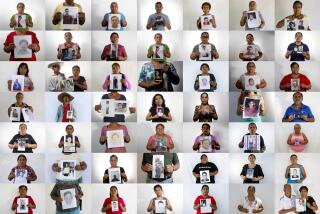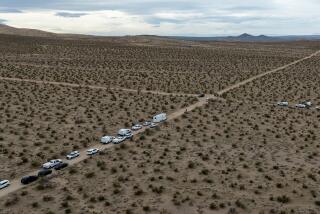Mexico’s enduring problems: The missing and the unidentified dead
MEXICO CITY -- At least 25 bodies have been reported found in two clandestine graves, underscoring Mexico’s enduring problems of people who go missing and the dead who are never identified.
Nineteen bodies were pulled from a mass grave on Jalisco state’s border with Michoacan state, an especially troubled region where drug cartels are battling one another, authorities and armed civilian vigilante groups. An additional six bodies were found in another clandestine burial pit near the tourist-destination city of Acapulco, authorities said Friday.
The revelations come after a relative lull in the publicizing of such finds, which were especially common in 2010-12. Thousands of Mexicans and Central American migrants went missing during the six-year term of President Felipe Calderon, which ended Dec. 1, and during the first year of his successor, President Enrique Peña Nieto.
Many of the missing eventually turn up in mass graves, victims of drug traffickers, kidnappers, extortionists, smugglers, corrupt law enforcement or rivals. Little has been done to identify the dead.
In Jalisco, where the 19 bodies, among them at least two women, had been exhumed, officials told local media (link in Spanish) that the digging continued.
Authorities were reportedly drawn to the site by information provided by 25 people arrested in Michoacan in connection with the disappearance of two federal investigators.
In Acapulco, Guerrero state prosecutors said the decomposed bodies of five men and a woman were found buried in a lime grove after officials received a phone tip. The victims had been shot, and a burned car was found near the burial site, prosecutors said.
Peña Nieto’s government has increasingly been thwarted in its efforts to downplay reports of violence. Addressing the issue of 26,000 people reported missing during his predecessor’s administration -- a number that Calderon’s government also sought to conceal -- Peña Nieto nine months ago announced an initiative to form a reliable database of the missing. In May, he announced the creation of a task force to search for them.
But human rights groups say little action followed the announcements.
New York-based Human Rights Watch, echoing complaints in Mexico, this week urged the government to follow through on its promise to examine, purge and verify a database of the missing, as a basis for a more organized, systematic search.
“The Peña Nieto government took an important step toward acknowledging the scale of the disappearance crisis when it released its provisional list of disappeared and missing people,” Jose Miguel Vivanco, director of the group’s Americas office, said in a statement. “Now the government needs to live up to its promise to develop a reliable, comprehensive registry, accompanied by serious investigations to search for the disappeared and bring those responsible to justice.”
Many of the missing have been seized by the military or police, never to reappear.
ALSO:
Philippines government defends typhoon response
China to loosen its one-child policy, end labor camps
Remittances to Latin America rebound -- except in Mexicowilkinson@latimes.com
More to Read
Start your day right
Sign up for Essential California for news, features and recommendations from the L.A. Times and beyond in your inbox six days a week.
You may occasionally receive promotional content from the Los Angeles Times.







